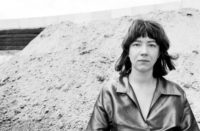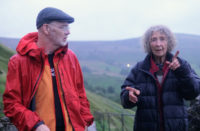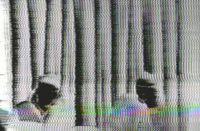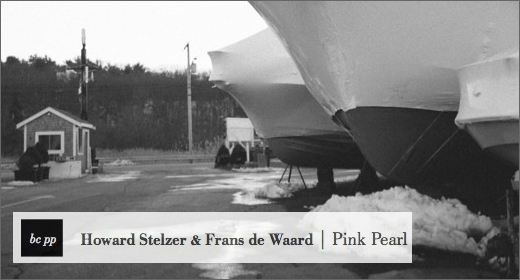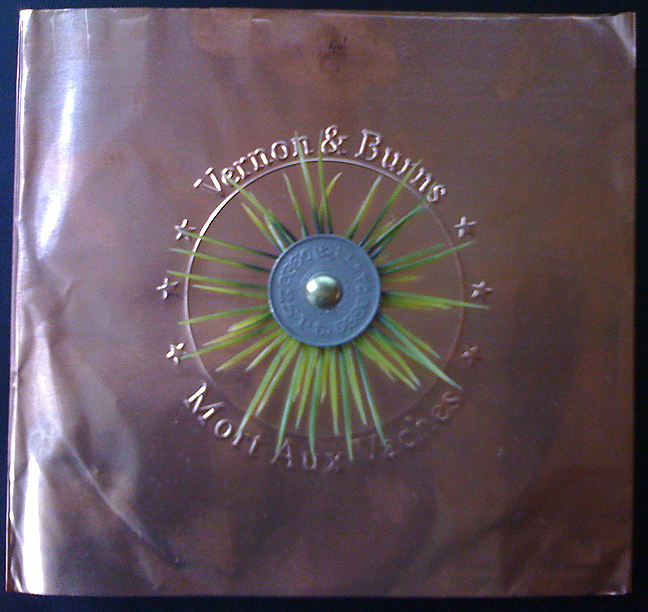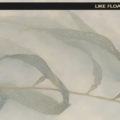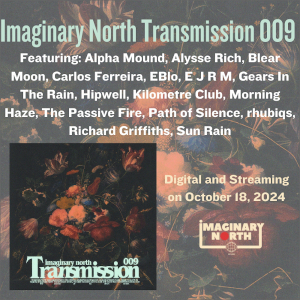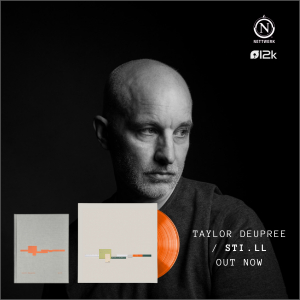::..:::…..:..::….:::::..:::..:::::::……:::…::.:::….::::..:..:::…::…….:::::
IGLOO: What’s the music scene in The Netherlands like? Are there some new interesting artists or labels coming from there?
Frans de Waard: Good question. Is there a scene at all? I don’t think there is a real scene of people meeting all the time, but they merely meet sometimes. I think I know most of the people, either through my previous work at Staalplaat who released a good portion of Dutch artists (like myself, THU20, Det Wiehl, Jaap Blonk, Radboud Mens, LOSD) or from my volunteer job at Extrapool, which is, among other things a small concert space in Nijmegen. The last few years saw the emerge of Mixer, which is a fine label, run by Martijn of Boca Raton, which I think is a name to keep an eye open for. And also Mechanizedmind, a new CDR label that seem to be quite nice. So it’s not really a scene, but various people doing their own things.
IGLOO: What’s the difference between both labels you run: Korm Plastics
and Plinkity Plonk? Also, can you tell us about Brombron?
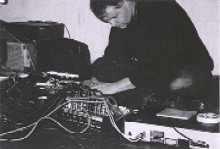
Frans de Waard: KP is my own label (since 1984). The first years I released cassettes, then vinyl for a while and by the time I was to release my first CD (by Arcane Device) I started to work for Staalplaat. First we did some releases on both labels, then I started a series of cheap CDs to introduce young and new artists and then I did a lot of vinyl. Early 2002 I started again with the label, new numbering and now after leaving Staalplaat, I continue with those releases. The main thing for KP is: if I like the music I will release it.
PP started some years ago as the Beequeen label, firstly to release music by Beequeen and some solo things, but now we release music we both like. Freek Kinkelaar and I judge together the proposals and if we both like it, we will release it. The music for PP will be drone based, but it’s a wide definition. For KP it can be anything I like. Plans for KP releases include a project by me and Asmus Tietchens based on sound recordings by John Watermann (who died in 2002), a Merzbow Kapotte Muziek 3CD set, a Thurston Moore CD. For PP there will soon be a Paul Panhuysen CD, and then a re-issue by De Fabriek and a CD with historical recordings by the Legendary Pink Dots. Also we hope
to release a CD by Mirror somewhere in the future.
Brombron I started with Extrapool, who have a small studio in which people are invited to work on a joint project for which they don’t have the time otherwise. They stay for say a week in Extrapool as artists in residence, make a project (which not always results in a
CD), and a live presentation. In the past these CDs were released by Staalplaat, but since it was my project, they thought it would be a good idea if I was to release these CDs myself in the future. Now the project is extended and also Worm (a club from Rotterdam) takes part in it. From our side there will be one with Peter Duimelinks/Frank Bretschneider, Joe Colley/Carl Micheal von Hauswolff and Andrew McKenzie with an as yet undisclosed person; All to be recorded somewhere in 2004.
IGLOO: Please explain your musical projects – Freiband, Shifts, Kapotte Muziek, Goem, Beequeen… Are there more? What are they all about?
Frans de Waard: Currently there are four bands and three solo projects. KM and Goem are two bands with the same three members, me, Peter Duimelinks and
Roel Meelkop. Both of these bands play live mainly, certainly KM. With Goem we haven’t done any studio for the last 2 years, because it has come to a dead-end, we think. Only very recently we completed an Esplendor Geometrico remix, but the idea is to come to the studio soon with fresh ideas for a fresh studio CD. I used to do KM on my own, but I decided not to any studio recordings as KM (the final studio work Curing Without Killing will soon be released on Fencing Flatworm) and now all new KM work will be either live or the studio-work with the three of us (such as our forthcoming collaboration with Richard Ramirez).
Beequeen is my band with Freek Kinkelaar (since 1989) and we are currently working on our next CD The Body Shop, which will be very rock music, with lots of guitars, drums, organs and also field recordings. But unlike many others we play most instruments ourselves, or we have guest musicians (hornblowers, female vocals, cello). As an offshoot to Beequeen there is Wander that continues the drone side of Beequeen.
The conceptual ideas are to release only once in every format (so far we did a 7″, 10″, LP and a CDR) and each release takes one instrument as its source. Freiband is my most active solo project, with lots of remixing (super furry animals, mist, zion train, new blockaders etc). Right now I am working on Leise, the third studio CD, with all sounds made by my daughter Elise (note the anagram), which I started over a year ago.
Shifts was recently revived, and sort of replaces the KM studio work. Shifts is all about guitar works, but in its current incarnation I am recycling all sorts of previous Shifts recordings into new work. Very fast work, almost like I am making my paintings (which I use on the front cover of the releases), but it’s a way of working that I like very much.
The final solo project is under my own name, in which I mainly use field recordings, which is not very much, but i have various small releases as that. I also made some sound installations, but since nobody invites me, I only did two. All other names are best covered with a fair amount of historical dust.
IGLOO: Do you listen the releases more than once when you review them in
Vital Weekly?
Frans de Waard: Who says I listen to them at all? Sometimes I play them indeed once and sometimes it takes 10 times to hear it before I can say anything about it. It varies a lot. But I have the arrogance to say that I am quite an experienced listener, so I can easily judge if something is good or bad for at least 80% of what I am hearing. Will I be hearing much of this later on? Not really, as the constant flood of what comes in is indeed constant, so there is always new stuff. Do I keep all stuff? No, sometimes I just give it away, and something I sell it. As I’m doing Vital for now close to 18 years without any financial support, so I have to get money from somewhere. I scratch your back, you scratch mine – that idea.
IGLOO: I see… Generally I think everyone who’s reviewing the music should be able to create an opinion about some release while listening to it for the first time. But please tell me about the beginning of Vital Weekly. Today it’s one of the most comprehensible, influential and most interesting ‘zines about (mostly) all different kinds of experimental music. How and when did it start?
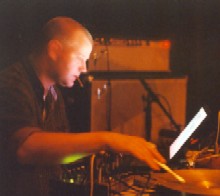 Frans de Waard: Actually I started a small fanzine in 1985, called Nul Nul (meaning zero-zero in Dutch) and it had four issues. But it was not a profitable thing, nobody paying for sold copies etc. So after four issues I did an English sort of pamphlet thing: two A4 pages, folded, with interviews and reviews. The idea was that it would be in black/white so that everybody could make Xeroxes of it and spread it around. In the early days a lot of people did, maybe the first few issues had runs of 5000-7000. I did that until 1995, 44 issues in total, growing in size and content. In 1995 I was working for
Frans de Waard: Actually I started a small fanzine in 1985, called Nul Nul (meaning zero-zero in Dutch) and it had four issues. But it was not a profitable thing, nobody paying for sold copies etc. So after four issues I did an English sort of pamphlet thing: two A4 pages, folded, with interviews and reviews. The idea was that it would be in black/white so that everybody could make Xeroxes of it and spread it around. In the early days a lot of people did, maybe the first few issues had runs of 5000-7000. I did that until 1995, 44 issues in total, growing in size and content. In 1995 I was working for
Staalplaat and we got e-mail. I then thought it would be nice to send out a weekly newsletter with just reviews. With some minor revisions, it’s still running. The announcement section came later and is sometimes bigger than the real issue. Currently it has about 2500 readers and probably more. Still I think it would be nice to issue the paper version in a book form, but I think money and time will be a problem…
IGLOO: What’s your connection to the Earational festival?
Frans de Waard: I played in the first edition with Goem in 1998, when it was very small. I know the organizer, Anton Viergever (since 1984), when i was releasing cassettes. Over the years we have been in contact and I helped him with advice – and such. A minor thing, really. Since leaving Staalplaat we intensified contact and so Anton asked me to do the production work as well as some more artistic advice. The production work is booking hotels, plane tickets, hiring a pa and drinking at night. Quite a nice job, bad for the liver though. It’s now over and it was all very nice. Meeting nice people with whom I was in contact but never met, like Colin Potter and Jonathan Coleclough or again, like Steve Stapleton.
IGLOO: What do you think about mainstream vs. underground music today?
Frans de Waard: Nothing really. I am not concerned with mainstream music at all. If I watch TV, I never watch any music television so I really don’t know what’s on. I just care about old mainstream, still a big lover of The Beatles and still a sucker of independent music of the early 80s (Joy Division, A Certain Ratio – that stuff – 24 Hour Party People is a great film). I never think in terms of overground or underground really. I just think in terms of music.
::..:::…..:..::….:::::..:::..:::::::……:::…::.:::….::::..:..:::…::…….:::::






